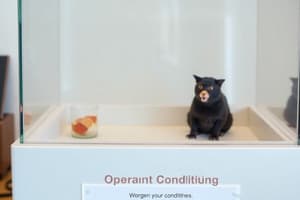Podcast
Questions and Answers
What does Skinner's concept of an 'operant' refer to?
What does Skinner's concept of an 'operant' refer to?
- A learned behavior from observational experience
- A response that operates on the environment (correct)
- A behavior triggered by an external stimulus
- An instinctual behavior pattern
What key concept did Skinner introduce that differentiates it from previous theories?
What key concept did Skinner introduce that differentiates it from previous theories?
- Classical conditioning
- Reinforcement theory
- Respondent conditioning
- Operant conditioning (correct)
Which of the following best describes Skinner's focus in his research?
Which of the following best describes Skinner's focus in his research?
- The analysis of behavior through its consequences (correct)
- The role of genetics in shaping behavior
- The emotional responses in behavioral development
- Social influences on behavior modification
In what year did Skinner begin publishing his influential papers on operant conditioning?
In what year did Skinner begin publishing his influential papers on operant conditioning?
Which of the following statements about respondents and operants is accurate?
Which of the following statements about respondents and operants is accurate?
What is the primary purpose of escape conditioning?
What is the primary purpose of escape conditioning?
Which of the following best describes stimulus generalization in operant conditioning?
Which of the following best describes stimulus generalization in operant conditioning?
How does operant conditioning differ from classical conditioning?
How does operant conditioning differ from classical conditioning?
What happens during the extinction phase of classical conditioning?
What happens during the extinction phase of classical conditioning?
What term describes the reappearance of a conditioned response after a time delay following extinction?
What term describes the reappearance of a conditioned response after a time delay following extinction?
What role does reinforcement play in operant conditioning?
What role does reinforcement play in operant conditioning?
In escape conditioning, what behavior is learned by the organism?
In escape conditioning, what behavior is learned by the organism?
What type of response is involved in classical conditioning?
What type of response is involved in classical conditioning?
What is the primary outcome of negative reinforcement?
What is the primary outcome of negative reinforcement?
What best describes stimulus discrimination?
What best describes stimulus discrimination?
Which of the following is an example of primary reinforcement?
Which of the following is an example of primary reinforcement?
How is secondary reinforcement different from primary reinforcement?
How is secondary reinforcement different from primary reinforcement?
What is an example of avoidance conditioning?
What is an example of avoidance conditioning?
Which of the following is considered a secondary reinforcer?
Which of the following is considered a secondary reinforcer?
What role do discrimination stimuli play in operant conditioning?
What role do discrimination stimuli play in operant conditioning?
Which of the following aspects is a characteristic of secondary reinforcement?
Which of the following aspects is a characteristic of secondary reinforcement?
What is the primary purpose of the Skinner box in Skinner's experiments?
What is the primary purpose of the Skinner box in Skinner's experiments?
How does a reinforcer function in operant conditioning?
How does a reinforcer function in operant conditioning?
Which type of reinforcement involves the introduction of a positive stimulus after a response?
Which type of reinforcement involves the introduction of a positive stimulus after a response?
What is the key difference between a reinforcer and a reward?
What is the key difference between a reinforcer and a reward?
Which statement regarding operant responses is true?
Which statement regarding operant responses is true?
What effect do both positive and negative reinforcers have on behavior?
What effect do both positive and negative reinforcers have on behavior?
What role does shaping play in operant conditioning?
What role does shaping play in operant conditioning?
What behavior did Skinner primarily reinforce in his experiments with rats?
What behavior did Skinner primarily reinforce in his experiments with rats?
Study Notes
Skinner Box and Instrumental Conditioning
- Skinner used a "Skinner box" to study the relationship between events in instrumental conditioning.
- The box contained a lever and a food tray.
- A rat was placed in the box and allowed to explore.
- When the rat pressed the lever, a food pellet was dispensed.
- Pressing the lever was the "operant response" and the food was the "reinforcer."
- The rat learned to associate the lever press with food, resulting in an increased rate of lever presses.
- Similar experiments were conducted on pigeons, and negative reinforcement and avoidance behavior were studied in dogs.
Basic Components of Operant Conditioning
- Operant: A response that has an effect on the environment.
- Reinforcer: An event that increases the probability of an operant behavior occurring again.
- Reinforcers can be positive or negative and increase the likelihood of a previous response happening again.
Types of Reinforcement
- Positive Reinforcement: Strengthens a response by presenting a positive stimulus after a response.
- Examples: Food for animals, attention, approval, and money for people.
- Negative Reinforcement: Strengthens a response by removing or reducing an unpleasant stimulus.
- Examples: Reducing or switching off an electric shock for an animal.
Primary and Secondary Reinforcement
- Primary Reinforcement: An innately reinforcing stimulus that satisfies a biological need.
- Examples: Food for a hungry person, warmth for a cold person.
- Secondary Reinforcement: A learned reinforcer that gets its power through association with primary reinforcers.
- Examples: Money, good grades, praise, and a pleasant tone of voice.
Stimulus Discrimination
- Organisms learn when to make a previously successful response and when not to.
- They do this by learning to recognize signals that indicate whether a reinforcer will or will not be available.
- These signals are called discrimination stimuli.
Avoidance Conditioning
- Occurs when an organism responds to a signal to avoid exposure to an aversive stimulus.
- Examples: Going to school or work to avoid losing a job, stopping at a red light to avoid a fine.
Escape Conditioning
- The organism learns to make a response to end an aversive stimulus.
- Examples: A dog learning to jump over a bar to escape an electric shock.
Stimulus Generalization
- Organisms often perform a response in the presence of a stimulus that is similar to one that was previously reinforced.
Difference between Operant and Classical Conditioning
- Both types of conditioning involve acquisition, extinction, spontaneous recovery, generalization, and discrimination.
- However, there are key differences:
Classical Conditioning
- Involves respondent behavior, which is elicited by a stimulus.
- The controlling stimulus comes before the response.
- Reinforcement depends on the presented conditioned stimulus, regardless of the animal's behavior.
Operant Conditioning
- Involves operant behavior, which is voluntary action.
- The controlling stimulus comes before the response.
- Reinforcement depends on the appropriate response.
- In classical conditioning, the unconditioned stimulus (e.g., food) is presented regardless of the animal's behavior.
Extinction & Spontaneous Recovery
- Extinction: The weakening of the conditioned response in the absence of the unconditioned stimulus (in classical conditioning).
- Without association with the UCS, the CS loses its power to elicit the CR.
- Spontaneous Recovery: The reappearance of a previously extinguished conditioned response after a period of time.
Operant Conditioning: The Work of B.F. Skinner
- Operant conditioning is a type of learning in which the consequences of behavior influence future behavior.
- Skinner extended Thorndike's ideas, emphasizing how organisms learn a response by operating on the environment.
- He identified the basic elements and laws of operant conditioning.
- He was the leading figure in this field and his work led to the development of behavior modification techniques.
- Skinner conducted experiments on pigeons, rats, and human beings.
- He defined "operant" as a response or class of responses that have a consistent effect on the environment.
- He distinguished operants from "respondents," which are behaviors elicited by stimuli.
- He argued that responses are "emitted" by the organism, meaning they are produced spontaneously without a readily identifiable stimulus.
Studying That Suits You
Use AI to generate personalized quizzes and flashcards to suit your learning preferences.
Related Documents
Description
Explore the foundational concepts of operant conditioning through B.F. Skinner's experiments using the Skinner box. This quiz covers the roles of operants, reinforcers, and the learning processes involved in behavior modification. Test your understanding of how reinforcement influences behavior in both rats and other animals.




